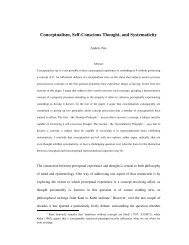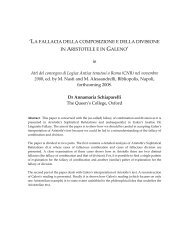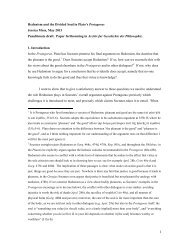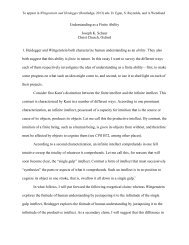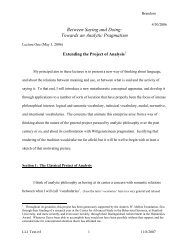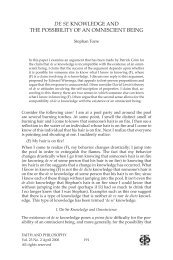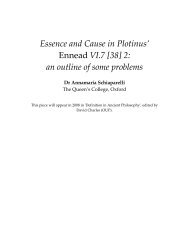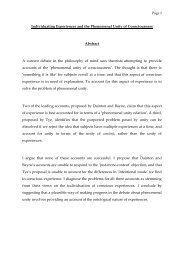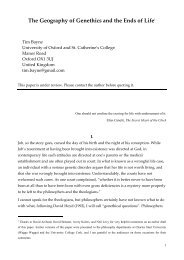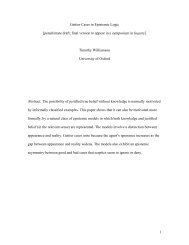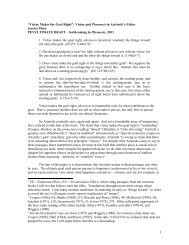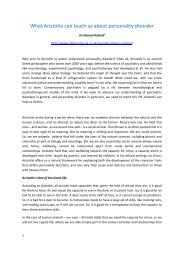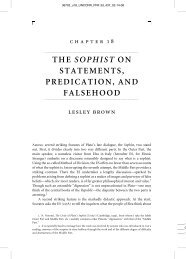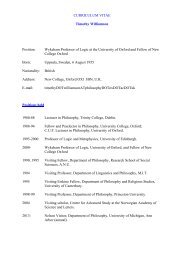Say who everyone is as you go along - Faculty of Philosophy ...
Say who everyone is as you go along - Faculty of Philosophy ...
Say who everyone is as you go along - Faculty of Philosophy ...
You also want an ePaper? Increase the reach of your titles
YUMPU automatically turns print PDFs into web optimized ePapers that Google loves.
6<br />
Th<strong>is</strong> seemed to open the possibility <strong>of</strong> sweeping away the old superstitions <strong>of</strong><br />
theology and metaphysics forever.<br />
It <strong>is</strong> possible to d<strong>is</strong>cern four ph<strong>as</strong>es <strong>of</strong> Nietzsche's life, three sane and one mad:<br />
an anti Socratic ph<strong>as</strong>e, a positiv<strong>is</strong>tic pro-Socratic ph<strong>as</strong>e, a relativ<strong>is</strong>t and pragmat<strong>is</strong>t<br />
Ph<strong>as</strong>e, and the final mad ph<strong>as</strong>e.<br />
The anti-Socratic Ph<strong>as</strong>e l<strong>as</strong>ts from 1869 to 1876. While holding the Chair <strong>of</strong><br />
Philology at the University <strong>of</strong> B<strong>as</strong>el (1864-1879) Nietzsche v<strong>is</strong>ited Richard Wagner<br />
at Lake Lucerne. In The Birth <strong>of</strong> Tragedy from the Spirit <strong>of</strong> Music (1872) Nietzsche<br />
searched for a new non-Chr<strong>is</strong>tian ethics in the Ancient Greeks and subsequently in<br />
Wagner. Nietzsche contr<strong>as</strong>ts Greek culture before and after Socrates with German<br />
culture before and after Wagner. He argues that life <strong>is</strong> essentially tragic and<br />
inexplicable but transmuted by art. The affirmation <strong>of</strong> life through creative genius<br />
transmutes life into an aesthetic phenomenon. Creative genius <strong>is</strong> the <strong>go</strong>al and<br />
justification <strong>of</strong> culture. The Dionysian and the Appollonian were fused in the<br />
tragedies <strong>of</strong> Aeschylus before the advent <strong>of</strong> Socrates effected their bifurcation. If<br />
their fusion could not be reinstated, it <strong>is</strong> a model to be emulated. During th<strong>is</strong> ph<strong>as</strong>e,<br />
Nietzsche w<strong>as</strong> heavily influenced by Schopenhauer. In Untimely Meditations (1873-<br />
6), Nietzsche <strong>is</strong> critical <strong>of</strong> the German theologican David Strauss (1808-1874),<br />
author <strong>of</strong> the controversial Leben Jesu (Life <strong>of</strong> Jesus) (1835) and advocates<br />
Schopenhauer’s philosophy, and Wagner’s opera and operatic theory. In 1870<br />
Nietzsche served <strong>as</strong> a volunteer medical orderly in the Franco-Prussian War.<br />
The positiv<strong>is</strong>tic pro-Socratic ph<strong>as</strong>e l<strong>as</strong>ts from 1876 to 1883. Nietzsche resigned<br />
from the chair at B<strong>as</strong>el in 1879 through ill-health and spent 1879-1889 in<br />
Switzerland, Italy, Germany, devoting h<strong>is</strong> time to writing. The book Human, All-too-<br />
Human (1898-9) <strong>is</strong> pr<strong>of</strong>oundly anti-metaphysical and material<strong>is</strong>t and includes<br />
natural<strong>is</strong>tic explanations <strong>of</strong> morality. For example: that a d<strong>is</strong>tinction <strong>is</strong> drawn<br />
between <strong>go</strong>od and evil <strong>is</strong> a necessary condition for a society. Conscience <strong>is</strong> the<br />
internal<strong>is</strong>ed voice <strong>of</strong> secular, not divine, authority: the father, the mother, the teacher.<br />
Daybreak (1881) <strong>is</strong> a tirade against ‘morality’. There <strong>is</strong> no God, no responsibility and<br />
no morality. Nietzsche undermines our confidence that in acting we have knowledge<br />
<strong>of</strong> the essential nature <strong>of</strong> our actions. Th<strong>is</strong> <strong>is</strong> a 'terrible truth'. (116) Our actions are<br />
never what they appear to be. Nor <strong>is</strong> there any security in the rest <strong>of</strong> knowledge:<br />
Neither the external world nor the internal world <strong>is</strong> <strong>as</strong> it appears. There <strong>is</strong> no escape<br />
from the perspectives <strong>of</strong> own subjectivity. Nietzsche h<strong>as</strong> an ex<strong>is</strong>tential<strong>is</strong>t<br />
appreciation <strong>of</strong> the lived reality <strong>of</strong> one’s own ex<strong>is</strong>tence. He says that around every<br />
being there <strong>is</strong> a circle, which h<strong>as</strong> a mid point unique to that being, but th<strong>is</strong> entails a<br />
qu<strong>as</strong>i-solips<strong>is</strong>m which makes knowledge impossible. Each <strong>of</strong> us <strong>is</strong> constrained by<br />
their senses <strong>as</strong> if in a pr<strong>is</strong>on. When Nietzsche says 'It <strong>is</strong> all <strong>of</strong> it an error' (D 117) he<br />
does not mean we can be even confident <strong>of</strong> th<strong>is</strong>. H<strong>is</strong> sceptic<strong>is</strong>m implies that any<br />
belief we hold could in principle be m<strong>is</strong>taken. Our so called ‘knowledge’ ex<strong>is</strong>ts only<br />
in relation to the kind <strong>of</strong> senses we have:



